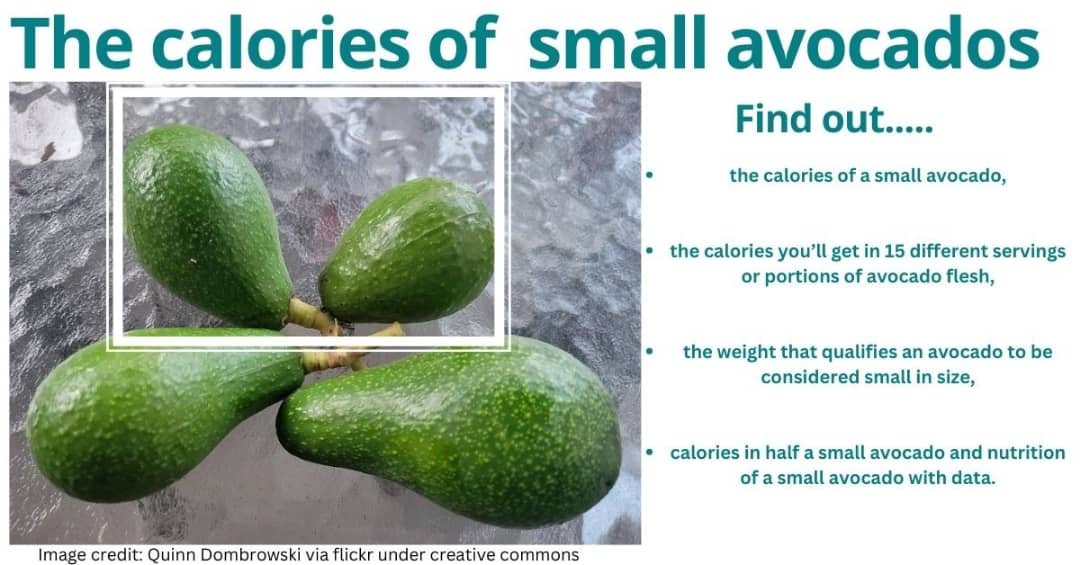
Table of Contents
A small avocado weighing 100g contains about 160 calories, 2g of protein, 14.7g of total fats, 8.53g of carbs, and 6.7g of dietary fiber, but only 7mg of sodium and no cholesterol. However, a small avocado weighing 130g will give you up to 208 calories.
As expected, this is considerably less than the calories for a medium-sized avocado as given in our previous article. The reason is that small avocados are less than medium-sized ones.
Some sources have estimated the calories in small avocados to be 120 or 180 without stating the size or weight of the avocado being considered. In comparing the calories in avocados, size matters and must be stated. The larger the more calories.
Small avocado weight.
With medium-sized avocados weighing about 150g, small avocados are taken to be those that weigh less than 150g. There is a range in the weight of small avocados. The heavier an avocado is, the more the number of calories it contains, conversely, the lighter the avocado the fewer calories it contains.
Since the calories contained in avocados are directly proportional to their weight, that explains the wide variation in the number of calories associated with small avocados. However, a significant part of that weight comes from the seed and skin which are not usually consumed with the flesh.
Therefore, knowing the amount of calories contained in the flesh without the seed and flesh gives a much better basis for analyzing the calorie content of a given portion of the fruit as we’ll see later.
Do keep in touch by signing up for our newsletter:
Calories in 1 avocado.
Avocados come in different sizes and weights so no single figure can be given for the calories in 1 avocado. Below are the number of calories contained in some common portions of the fruit by weight.
- Small avocado weighing 100g: 160 cal.
- Small avocado weighing 130g: 208 cal.
- Medium-sized avocado weighing 150g: 240 cal.
- Large-sized avocado weighing 201g: 322 cal.
The bigger or heavier the fruit the more calories you get from consuming it. For this reason, an equal fraction of different sizes of fruit differ in their caloric contents. Therefore, the standard serving sizes for the different sizes of avocados also differ considerably.
The serving size for medium-sized avocados is about 1/3rd of the fruit which gives about 80 calories. However, the serving size for a large fruit could range from 1/5 to 2/5 of the whole fruit. For a whole large avocado containing 322 calories, a serving size ratio of 1:5 will give you about 64 calories but if on a 2:5 ratio, you’ll get 128.8 calories.
You may have to eat half the entire size of a small avocado to get an equal number of calories from it as you would from bigger avocados.
Calories in ½ small avocado.
The calories in half small avocado with an initial weight of 100g is 80 calories while that for a fruit weighing 130g will be 104 calories. You get these figures by simply dividing the number of calories in one whole small avocado by 2, for instance:
160 cal ÷ 2 = 80 cal.
A significant part of the weight of the avocado mentioned here is from the seed and skin which are not usually consumed. Therefore you can’t use the figure given here as a reference point in determining the caloric content of portions of the flesh you consume.
To determine the caloric content of a given portion by weight of avocado flesh, you’ll need to use the caloric content of a peeled avocado without the seed as discussed in Table 1 of a previous article.
The number of calories in a medium-sized peeled avocado without the seed is 227 calories. With this, you can estimate the number of calories you’ll get by eating different portions of an avocado as shown in the table below.
| Portion/Amount of avocado flesh by weight | Number of calories |
|---|---|
| 10g | 16.7 cal. |
| 20g | 33.4 cal. |
| 30g | 50 cal. |
| 40g | 66.8 cal. |
| 50g | 83.5 cal. |
| 60g | 100 cal. |
| 70g | 116.8 cal. |
| 80g | 133.5 cal. |
| 90g | 150 cal. |
| 100g | 166.9 cal. |
| 130g | 217 cal. |
| 150g | 250.4 cal. |
| 160g | 267 cal. |
| 180g | 300 cal |
| 200g | 333.8 cal. |
Estimating the number of calories you get from any portion or serving size, of avocado flesh is very easy. Here is how to do it in 3 easy steps:
- Weight of 1 whole avocado fruit with skin and seed removed (the flesh): 136g
- Number of calorie content: 227 cal.
- Therefore, the number of calorie content in any “W” weight (in grams) of the flesh = (W ÷ 136g) × 227 calories.
For example:
(200g ÷ 136g) × 227 calories = 333.8 calories
This is approximately equal to 334 calories. 334 calories represents a good estimate of the calorie content of an avocado flesh weighing 200g.
This seems way above the 322 calories earlier quoted for large-sized avocados weighing 201g, right? That’s because the avocado still has its seed and skin making up part of that weight. With those removed, the weight of the avocado flesh which provides 322 calories will be much less than 201g.
Small avocado nutrition.
That an avocado is small, doesn’t mean it doesn’t contain all the nutrients found in the bigger ones. It does but in amounts that are commensurate with its overall size. Below is a table of some of the nutrients you’ll find in an avocado and their amount in a small avocado of 100g.
| Nutrient | Amount |
|---|---|
| Water | 73.2g |
| Energy | 160 Kcal (160 calories for short) |
| protein | 2g |
| Total fat | 14.7g |
| Carbs | 8.53g |
| Total dietary fiber | 6.7g |
| Sodium | 7mg |
| Vitamin C | 10mg |
| Vitamin A | 146 IU |
| Lutein + zeaxanthin | 271µg |
| Vitamin E | 2.07mg |
| Vitamin K | 21µg |
| Total saturated fats | 2.13g |
| Total monounsaturated fats | 9.8g |
| Total polyunsaturated fats | 1.82g |
As with many fruits, most of the content of avocado fruits is water which is essential for many physiological or metabolic processes in your body. Second to this is its fat content which gives it its high caloric value.
However, most of its 14.7g of fat is unsaturated fatty acids with lots of health benefits as discussed in an earlier article on this subject.
Avocados are also rich in the two types of dietary fibers as we have discussed in another topic you may want to read. Its fibers are known to promote gut health, reduce cholesterol, and have anti-cancer benefits among others.
Small avocado protein.
A small avocado that weighs about 100g has about 2g of protein as shown in the nutrition data above. One serving of avocado, according to the National Labeling and Education Act(NLEA), is 50g which represents about half the total size of a small avocado. This amount contains only 1g of protein.
Your daily dietary protein need is about 0.8g per kilogram of your body weight. If your body weight is 70g, you do need about 56g of protein daily which will require not less than 28 small avocados.
According to the Food and Drug Administration, any food whose single serving has less than 5% of the required daily intake of a particular nutrient is considered a low source for that nutrient. (source)
Since a serving (50g) of small avocado weighing 100g has only 1g of protein, this represents only 2% of the required daily dietary intake so it falls in the category of a low source of protein.
Generally, avocados are not good sources of protein since even large-sized fruits contain only about 4g of it. A serving of a 201g large avocado ( with 2/5th of the fruit in one serving size) offers you only about 1.6g of protein. This represents about 2.9% of your required daily dietary intake of proteins if you are a 70kg adult in need of 56g of protein daily.

























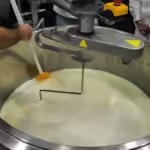


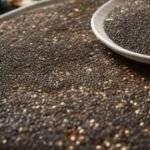
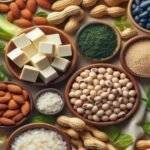









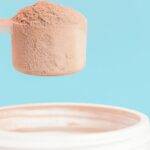


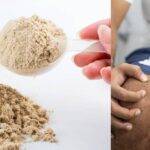





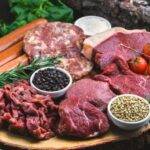






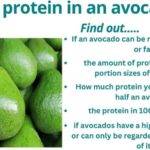




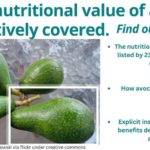
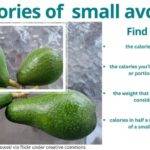
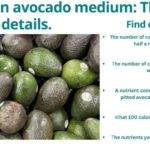
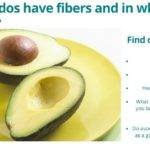
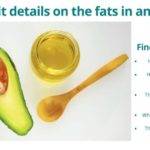

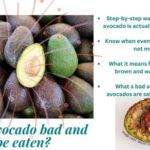








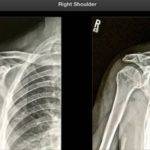



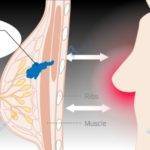
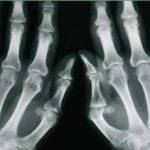










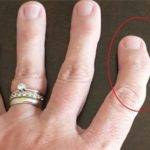





















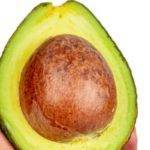
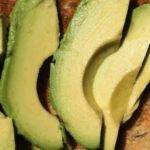










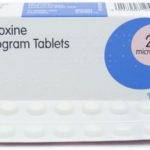


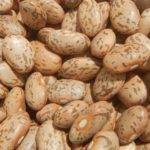
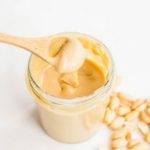








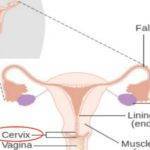


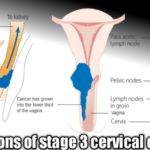










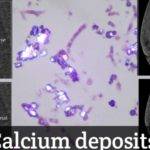






You’re so intelligent. Your stuff’s nice. Keep it coming!
Fascinating blog!